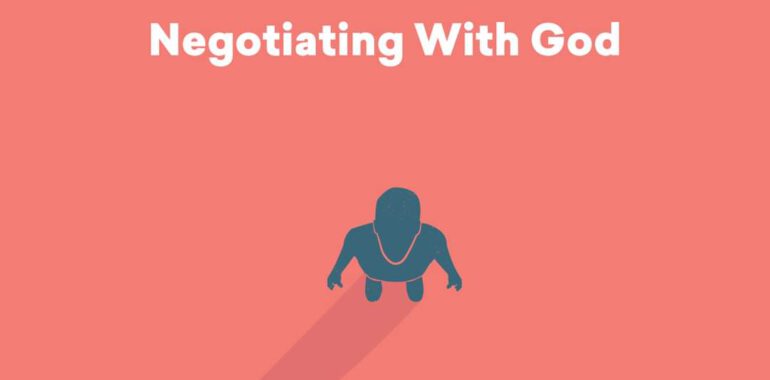Negotiating With God

Negotiating With God
“She was deeply distressed and prayed to the Lord and wept bitterly. And she vowed a vow and said, “O Lord of hosts, if you will indeed look on the affliction of your servant and remember me and not forget your servant, but will give to your servant a son, then I will give him to the Lord all the days of his life, and no razor shall touch his head.” (1 Samuel 1:10-11, ESV)
Have you ever tried to bargain with God? Is there an ongoing negotiation right now in your spiritual life?
Perhaps you’ve never spoken these prayers aloud, but have there been similar silent dialogues like these?
 “Lord, if you give me that job with the handsome pay increase, I will be incredibly generous with the extra income.”
“Lord, if you give me that job with the handsome pay increase, I will be incredibly generous with the extra income.”
 “Father, if you allow us to win the bidding war on that dream house in our dream community, we’ll start an evangelistic Bible study for our neighbors.”
“Father, if you allow us to win the bidding war on that dream house in our dream community, we’ll start an evangelistic Bible study for our neighbors.”
 “Jesus, if you help me pass my driving test, I’ll serve you this summer by going on that missions trip that I’ve been on the fence about.”
“Jesus, if you help me pass my driving test, I’ll serve you this summer by going on that missions trip that I’ve been on the fence about.”
Maybe your bargaining chips aren’t significant as a new house or a career change, but in the mundane circumstances of daily life, we’ll all be tempted to strike a deal with the sovereign Creator of the universe.
Some Christians have argued that there are bargains in Scripture in which God seems to have willingly participated. One of the prime examples is Hannah.
“She was deeply distressed and prayed to the Lord and wept bitterly. And she vowed a vow and said, “O Lord of hosts, if you will indeed look on the affliction of your servant and remember me and not forget your servant, but will give to your servant a son, then I will give him to the Lord all the days of his life, and no razor shall touch his head.” (1 Samuel 1:10-11, ESV)
At first glance, this does look like a bargain with God, and in fact, God did give Hannah a son. However, the story needs closer examination. Hannah has a conversation with Eli, the priest, “then the woman went her way and ate, and her face was no longer sad.” (v. 18)
If you are striking a bargain with God, it is only 𝙖𝙛𝙩𝙚𝙧 you have received what you wanted that you experience positive emotions and celebrate getting what you wanted. Not so for Hannah. She is not waiting for the birth of her baby for joy and peace to return; she has it now.
Hannah’s prayer was not a negotiation with God to get her desire but an abandonment of her desire—yes, even a biblical one—for an even better one.
Rather than being consumed solely by her own purpose, she chooses to be captivated by God’s. Rather than attaching a happy life to the fulfillment of her own desires, she finds life in the success of God’s kingdom.
Perhaps there is no more crucial human thought process than, “If I had _________, then I would be happy.” Whatever fills in that blank will compete with the Lord for control of your heart, and whatever controls your heart will shape and direct your behavior.
In the purest of jealousies, God will never allow anything to compete with him for the rulership of our souls. Therefore, he refuses to participate in any bargain that would tempt us to search for life outside of him.
He knows that unless we find our ultimate joy in him, we will become hopelessly enslaved to things that can never deliver the happiness we think we are seeking. False messiahs always disappoint us, leaving us more despondent, bitter, and morally bankrupt.
Hannah is not negotiating with God for a son. Of course, she desires a son—a beautiful, biblical desire—but she is letting go of this desire to grab hold of and submit something infinitely better: God’s perfect, wise, and loving will for her life.
Don’t stop asking God to fulfill the desires of your heart, but also never stop asking God to expose whether these desires are horizontal and self-serving rather than vertical and God-honoring.
When your desires belong to the Lord, and you are fully content in him, you can experience the best and brightest of lives, no matter how he answers your prayers.


